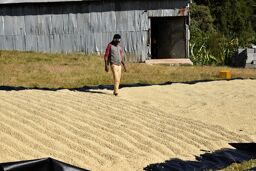About this coffee
Marketing tools & Certifications
POS displays, postcards, QR codes for packaging, ...
- Ethiopia
Origin
Zone
Guji Terroir
Uraga - Tabe Burka
Farm
- Barkume
Producer
Species
Arabica Variety
Heirloom
Process
Natural
Drying
Drying beds
Packaging
60kg - Jute bags
Altitude
1850 Harvest period
November - December Type of harvest
Manual
The farm Tabe Burka
Uraga coffee is sourced from smallholder farmers whose plots lie within a 10 to 20 km radius of the local washing stations. These stations, managed by private owners, act as central collection points, bringing together cherries from numerous nearby producers.
Situated in the renowned Guji appellation, the Uraga district shares its borders with Odo Shakisso and Hambela—both famous for producing exceptional Guji coffees. Yet, Uraga stands out not only for the quality of its cup but also for the deep-rooted history of coffee cultivation in the area. In fact, coffee growing in Uraga may predate that of its neighboring districts. Among the trees here is a rare varietal producing yellow cherries, known locally as Wallagga—a name that hints at the long journey and origin of these coffee trees.
Farming in Uraga follows a traditional polyculture system, where coffee is intercropped with various food crops. A central component of this system is the enset (false banana tree), a plant of immense agronomic and cultural significance. The root of the enset, when pounded and fermented, forms a staple of the local diet. But beyond its nutritional value, enset plays a vital ecological role. It stores water in its trunk, providing a steady source of moisture during dry spells. Its presence amidst the coffee trees helps maintain a stable microclimate, shielding the plants from harsh conditions and supporting year-round vitality.
This unique integration of ecology, tradition, and biodiversity makes Uraga coffee not only distinctive in flavor but also a testament to sustainable, time-honored agricultural practices.
Shady
Orchard Agroforestry level
2 - Complex

Meet Barkume
A few words about Barkume
Equipments selection
Unit price
€ ex.tax/U
From xx products
€ ex.tax/U
Unit price
€ ex.tax/U
From xx products
€ ex.tax/U
Unit price
€ ex.tax/U
From xx products
€ ex.tax/U
Unit price
€ ex.tax/U
From xx products
€ ex.tax/U
Unit price
€ ex.tax/U
From xx products
€ ex.tax/U
Unit price
€ ex.tax/U
From xx products
€ ex.tax/U
Unit price
€ ex.tax/U
From xx products
€ ex.tax/U

